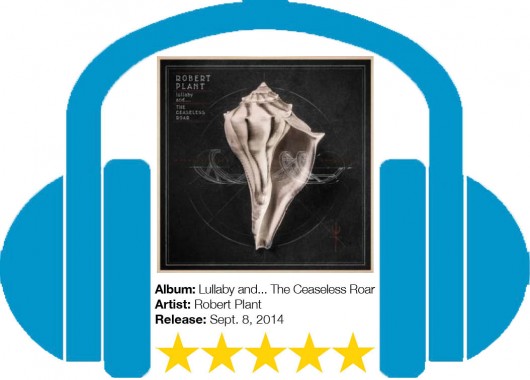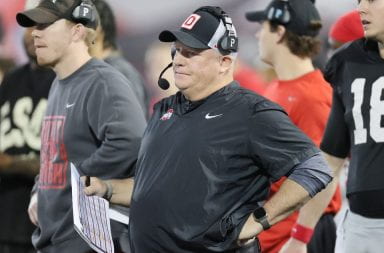
Click to enlarge.
You’re probably expecting and hoping that I’ll tell you that on his new album, Robert Plant brings us back to the “dancing days” of Led Zeppelin and rocks out full throttle, right? Well, that’s definitely not what happens on Robert Plant’s new album “lullaby and… The Ceaseless Roar.” But that doesn’t mean that Plant’s eclectic, ambient and lovely album is without merit. Not by a long shot.
The rumblings of a Led Zeppelin comeback album have been soaring ever since the rock band’s successful return to the stage for a one-off show in 2007. The band members have been cagey, yet still teasing about the possibility ever since, and this year’s reissues of the first three albums have sold quite well.
But despite this, and the outspoken eagerness of guitarist Jimmy Page, singer Plant never fully opened the door. He’s gone as far as to say that he is “slightly disappointed and baffled” by Page’s hopes for a reunion and that he’s “not part of a jukebox!”
And listening to “Lullaby,” you can tell that he’s a man of his word. The record is full of hints of world music and electronica and features an eerie piano ballad. The album’s unifying quality is Plant’s gorgeous voice — his falsetto is light, fragile and alluring. I think there’s a strong case to be made that his voice has gotten better over time. I certainly enjoy hearing his voice more when he’s clearly singing than the days of Zeppelin howling, but we’ll get to the devil’s advocate part later.
“Little Maggie” is an interesting way to open up an album. An African instrument, the kologo, starts off this blend of Radiohead-esque electronica beats and bloops and African folk. And Plant’s falsetto stuns throughout the song.
But the first highlight on the album, and indeed one of its strongest songs, is the following song “Rainbow.” It’s a clear instance of intriguing and delayed guitars and instrumentals perfectly complementing Plant’s voice. He howls again, but not like he did on the days of “Rock and Roll” and “Whole Lotta Love.” Here his falsetto, like a rower steering a boat down river, guides us through the complicated blend of musical tones that the song features, like a rower guiding a boat down a river. The lyrics and indeed his voice prove to serenade the listener with a moving tale of delicate devotion.
“I found a lucky charm / I dressed it up with love / I crossed the Seven Seas to you / Will it be enough?”
In spite of Plant’s legendary promiscuity as a rock star, with lyrics like these, one wonders what could have prompted the recent split between him and long-time partner Patty Griffin. Plant’s romantic treatises are a recurring theme throughout the record, perhaps informed by this personal turmoil.
Haunting song “Embrace Another Fall” seems to be a premonition on Plant’s part. It combines an eerie synthesizer backdrop with an unrelenting rhythm and serrated, jagged guitar riffs, with a lyric recoiling at the narrator’s misfortune.
“And out upon the shire / All through the forest and rain / I make my home.”
This lyric could also be a reference to the Shire found in “The Lord of the Rings.” Led Zeppelin had a history of nodding to the J.R.R. Tolkien series in songs such as “Ramble On,” “The Battle of Evermore” and “Over the Hills and Far Away,” so this wouldn’t be much of a stretch.
And “Turn It Up” is a Zeppelin-like bluesy rocker with a touch of Tom Waits.
It’s also another song where Plant shows a knack for painting vivid images with his lyrics. This one is a bit menacing.
“I’m lost inside America / I’m turning inside out / I’m turning into someone else I heard so much about.”
“A Stolen Kiss” is a touching piano ballad where Plant’s voice, again, shines.
Plant crafts a striking line here that evokes a novelistic journey — “I’m drawn into the western shore / Where the light moves bright upon the tide / To the lullaby and the ceaseless roar/ And the songs that never die.”
But the next song, “Somebody There,” is the standout song on the album. It heralds in the celebratory tone of the record that Plant mentioned in interviews with saccharine guitar melodies that echo the exquisite Zeppelin song “Tangerine.” It is a calming, beautiful moment that, as much of the album successfully manages to do, builds a real sense of place in the listener. Just as “Embrace Another Fall” sends the listener to the idyllic lands of Tolkien’s Shire, “Somebody There” reminds the audience of the lush, green valleys and fields of Plant’s native Staffordshire in England, which is colloquially known as “Little Switzerland.”
“Poor Howard,” an adaptation of a song by classic folk and blues musician Lead Belly, builds on this sort of musical journey with its lovely strings and banjos.
It’s incredible how Plant manages to transport with this album, considering the eclecticism of the instruments and soundscapes used on it, and this song again feels like a sort of autumnal travelogue.
The album’s closer “Arbaden (Maggie’s Babby)” features the Fulani chanting of Gambian musician Juldeh Camara.
To sum up, Robert Plant might not rock the way Zeppelin did on this album, but it doesn’t matter. “lullaby and… The Ceaseless Roar,” guides the listener through a moving, literary blend of tones, ballads and celebration. This album does an extraordinary job of creating and setting mood, and listening to it, I definitely found that while I love Led Zeppelin’s iconic albums, I think I enjoy Plant’s voice on this album more. It’s more interesting when he complements his intriguing lyrics with his fragile, emotive falsetto.


